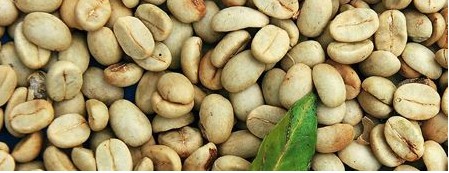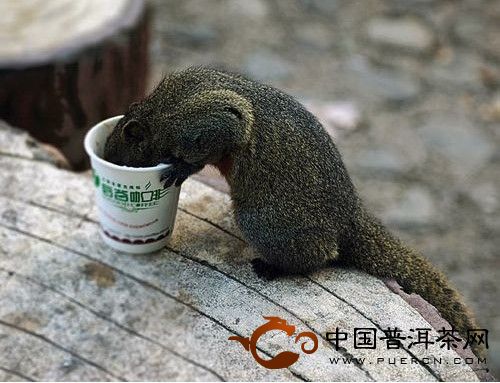Pu'er coffee planting science
(by John Chou / tr. by Phil Newell)
People living in modern cities are no stranger to the word "coffee", and its inherent form is so deeply rooted in the hearts of the people: black slightly bitter liquid is filled in porcelain cups, and coffee fans drink its acid and taste its bitterness. even sentiment has become an indispensable culture of coffee.
There is no denying that I like coffee, too. By chance, I met a coffee grower, Mr. Sun. I mentioned that I wanted to see how coffee was grown. He teased me in front of the computer screen: it's hard to get to the coffee base. I replied: no matter how bitter it is, it can't be more bitter than the long March 25000.

As a result of the dialogue, I carried my luggage, reversed a plane and two long-distance buses, and came to a place called Lancang Lahu Autonomous County. Lancang is in Pu'er. Speaking of Pu'er, the first thing people think of is Pu'er tea, but as of October 2011, the coffee planting area in Pu'er City was 425000 mu, accounting for 65.6% of the country's 648000 mu of coffee planting area, accounting for 65.8% of Yunnan's 646000 mu coffee planting area. the output and output value are more than 50% in Yunnan Province. Five world-famous coffee giants-Nestl é, Maxwell, Kraft, Newman and Ikham-have all entered Yunnan, while Japanese UCC and Taiwan coffee brands have also entered the Yunnan horse racing enclosure. It is worth mentioning that in November 2011, Starbucks signed a "Memorandum of understanding" with the Pu'er municipal government to promote the development of the coffee industry, which is also Starbucks' first coffee planting base in the world. You can imagine the status of Yunnan coffee in the eyes of coffee industry.
I always thought I could see the beauty of coffee, as I saw in Luang Prabang, Laos, in the lower reaches of the Lancang River-cafes and pubs. When I stood at the crossroads of Lancang County, apart from the lively streets (Yunnan's unique "market day") and the occasional flashes of Lahu women in national costumes, the houses, goods, and people of this county were not much different from those of many counties in China, but the strangest thing was that in such a coffee-rich place, a decent cafe could not be found in the streets. If I hadn't been received, I wouldn't even know how to find the way to the coffee plantation.
The firewood teacher who received me said that coffee could not be bought in the county seat. As soon as most of the coffee beans were picked from the fields, they were collected by the major coffee companies, transported to the major processing plants, and repackaged on the shelves after passing through the production line. It has become the bagged coffee that we can see everywhere in the supermarket. As far as the people I have asked are concerned, many native-born people in Yunnan do not even know that Pu'er has patches of coffee-growing land. Do Lancang people drink coffee? They don't even have local access to locally freshly produced coffee beans.
Having married many coffee brands for many years, the pricing of coffee beans is still in the hands of companies such as Nestl é. Have you ever thought of being an independent brand in Yunnan? A director of a farmers' cooperative said with a wry smile: my coffee base is on the mountain and the scenery is excellent. I have always wanted to transform it into a holiday farm with sightseeing, but what if I want to do so? This existing framework cannot be broken, and the fact that farmers pay more attention to immediate interests also determines that cooperatives are unable to systematically carry out long-term plans. Usually, the written articles of association often face the risk of breach of contract in practice, which makes willing people do not dare to burn their bridges.
It's not that there are no crab eaters. Baoshan, another coffee-rich place in Yunnan, in addition to the state-run Lujiangba, has launched a bridgehead for coffee planting brand promotion in recent years-Hougu. Hougu even has the largest instant coffee production line in China, where there are not only traditional giants, but also emerging coffee brands, such as Qiu Mansion. The best thing about Qiu Mansion is not how superior its coffee is, but that it is good at storytelling marketing. It has been properly packaged from planting to production, including field picking rich in ethnic minority customs, novel and interesting coffee courses, and timely introduction of novel ways, such as the panda as the image of the panda coffee "hanging ear cup". In this way, the one-stop approach from upstream to downstream gives coffee beans a humanistic image that fits the current situation.
After all, such companies are still rare, it is easy to be labeled as a minority. The vast majority of coffee farms also rely on extensive agricultural production. "We have always focused too much on production and neglected to observe the market and consumers," Mr. Sun said. Of course, all kinds of magical foods brewing in Yunnan's wonderful soil, whether wine or ice wine, or truffles or ham, also lack as strict protection of origin as in EU agricultural policy, and lose standardization and exclusivity. Do things in their own way, it is inevitable that the good and the bad are intermingled.

In this country dominated by tea consumption, the rise of coffee is not only a drink, but also represents a new culture of life. Starbucks' domestic business in the United States is shrinking, but its coffee shops in China are springing up rapidly in first-and second-tier cities. The price of a standard cup of Starbucks coffee of the day is enough to buy half a kilogram of AA grade Yunnan coffee beans equivalent to 25 cups. On the other hand, people who drink coffee in a clear cafe don't care about the cost at all. instead of drinking coffee, they drink the psychological satisfaction of playing with the siren logo in their hands. For coffee growers in Yunnan, once they are no longer satisfied with low-cost branded production, rust will not become so terrible, and the top priority should be how to make a cup of beautiful drinks with stories, connotations and added value for the growing local market.
China Coffee Trading Network: www.gafei.com
Important Notice :
前街咖啡 FrontStreet Coffee has moved to new addredd:
FrontStreet Coffee Address: 315,Donghua East Road,GuangZhou
Tel:020 38364473
- Prev

The purchase price of Nestl é coffee in Yunnan hit a six-year low and fell below the cost.
Less than 13 yuan / kg, the day before yesterday, Nestl é gave the opening purchase price of Yunnan coffee beans. It is the first time in nearly a decade that a purchase price that cannot cover the cost of planting curry farmers is given, and the price has hit a new low in nearly six years. Nestl é's offer has always been a weather vane in Yunnan. The industry believes that such a low price will affect the enthusiasm of farmers, and even worry about whether coffee trees will be cut down.
- Next

Drinking 5 cups of tea or coffee a day reduces brain tumor risk by 40 percent
Drinking at least five cups of coffee or tea a day can help prevent brain tumors, according to a new study from Imperial College London, the Daily Mail reported Thursday. The study was published in the journal Cancer Epidemiology, Biomarkers and Prevention. During the trial, researchers tested more than 300 people diagnosed with gliomas, which usually start in the brain.
Related
- Beginners will see the "Coffee pull flower" guide!
- What is the difference between ice blog purified milk and ordinary milk coffee?
- Why is the Philippines the largest producer of crops in Liberia?
- For coffee extraction, should the fine powder be retained?
- How does extracted espresso fill pressed powder? How much strength does it take to press the powder?
- How to make jasmine cold extract coffee? Is the jasmine + latte good?
- Will this little toy really make the coffee taste better? How does Lily Drip affect coffee extraction?
- Will the action of slapping the filter cup also affect coffee extraction?
- What's the difference between powder-to-water ratio and powder-to-liquid ratio?
- What is the Ethiopian local species? What does it have to do with Heirloom native species?

